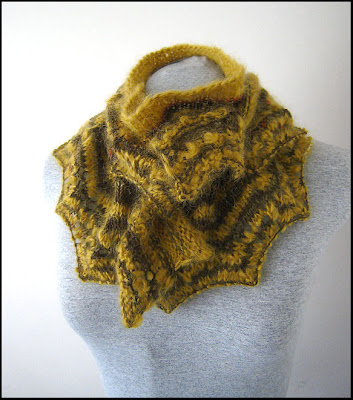Many people have asked me about ...tension.
If you have followed the manual instructions perfectly and still your stitch tension is off, from my experience here's how I adjust tension on my 257.
First of all, as you thread the machine, it is the utmost importance your thread is passed properly around the tension dial. To do so, you must put finger pressure (at the top right index finger) holding the thread down while pulling the thread over your left thumb (photo above) to place it into position. You want to make sure your thread is pulled tightly around the tension dial. You can continue to thread, as per manual instruction, the top thread.
IMPORTANT!
The blue thread is position exactly where you need to feel enough pull from
the tension spring before you put your thread into position.
Bobbin Threading...
Put your bobbin in counterclockwise. Note: The thread passing on top towards the left. Pass the thread into the notch and draw it left under the tension spring. Leave your sliding plate open and raise the bobbin thread by manually turning (gently) the hand wheel towards you. While holding the needle thread in your left hand. Keep turning the hand wheel until you see your bobbin thread appear through the needle plate. Now you are ready to do the first test.
This is the kind of Sample Test I love to do...
I make a straight stitch about 5-inch long for every tension number on a piece of lite double layer cotton fabric with two different thread colors. The Pressure Dial must be in the NORMAL position (even if your project needs to be sewn on DARN or MAX). In the sample above, I choose the black for the bobbing thread. The blue for the upper thread. The numbers correspond to the numbers on the Tension Dial.
Now, in a perfect world you want to have your Tension #5 to show a perfect stitch. From the top stitch you would barely see the bottom color showing between the stitch. And, from the back side you would see the Top stitch barely between the bottom stitch.
Obviously, it doesn't always happen this way. If your #5 looks like my #1 Tension, that means you need to adjust the bobbin tension. This takes time, turning the screw a little at a time and making a sample as many as you need. This could take a while depending on how much your tension is off. Look at the diagram (below) to help you...
Now, in a perfect world you want to have your Tension #5 to show a perfect stitch. From the top stitch you would barely see the bottom color showing between the stitch. And, from the back side you would see the Top stitch barely between the bottom stitch.
Obviously, it doesn't always happen this way. If your #5 looks like my #1 Tension, that means you need to adjust the bobbin tension. This takes time, turning the screw a little at a time and making a sample as many as you need. This could take a while depending on how much your tension is off. Look at the diagram (below) to help you...
If your tension is still off, it can be a combination of threading and tension. Make sure your machine is perfectly threaded.
Ok let's say you've reached nirvana and tension is perfect on your sample. Every time you start a new project with new fabric you'll have to make a little sample for your stitch tension. You obviously do not have to do the full tension test, but you will want to do 2 or 3 stitch lines, on your actual fabric, at different tension to see how it looks and adjust accordingly.
I hope I help released your Tension about Tension!
Happy sewing!





















